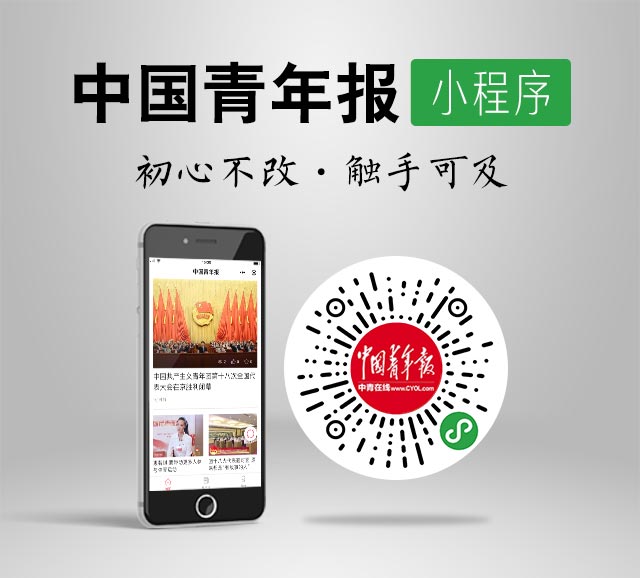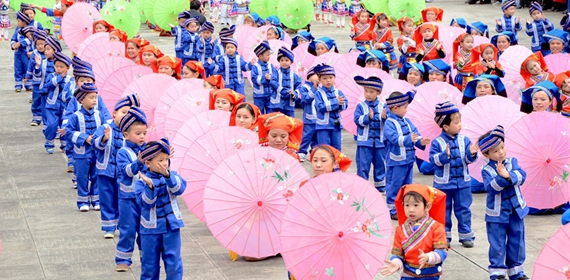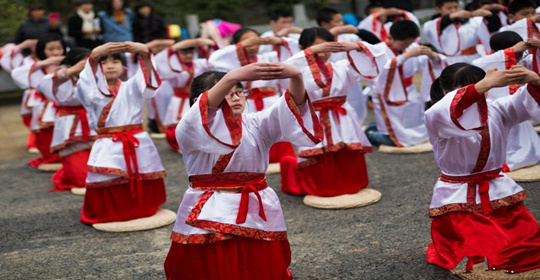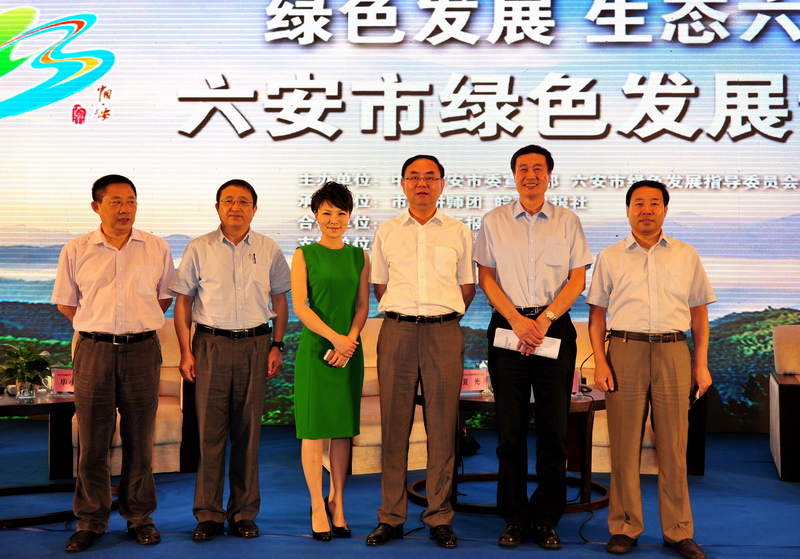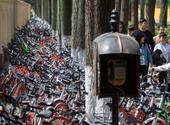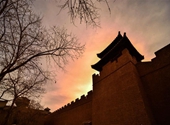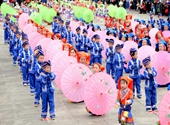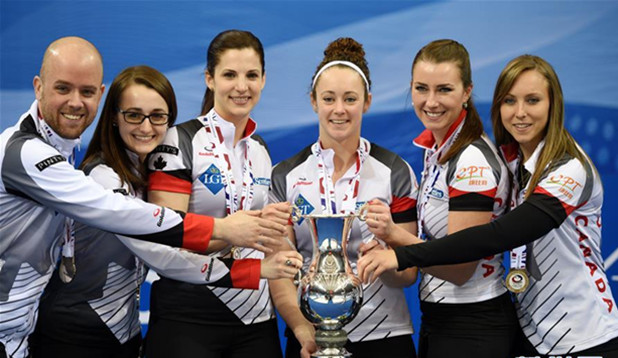- 首页 -- >> 新闻频道-- >> 国际-- >> 国际新闻
-
揭秘日本“奢侈水果”文化
发布时间:2017-03-28 13:04 来源:中国日报网
在日本有这样一种商店,乍一看“高大上”的橱窗让你以为它是一家珠宝店。仔细一看,才发现,原来那些亮丽的“珠宝”竟然是水果。但再一看价牌上挂着好几个零的标价,你又发现,其实管这些水果叫“珠宝”也不为过。“奢侈水果”文化在日本相当流行,原因究竟是什么呢?一起来看一下吧。
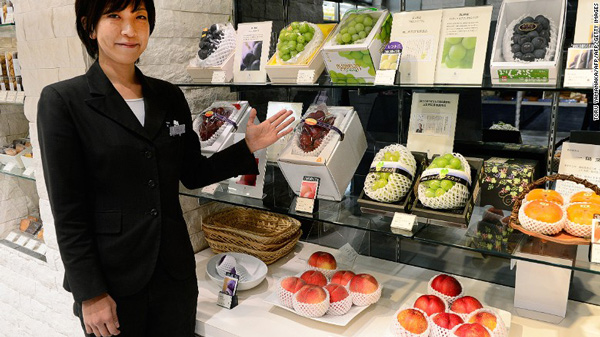
It looks like a jewelry shop with its high-end exterior. But a peek inside the sparkling glass display cases at any of Sembikiya's Tokyo outlets reveals expensive treasures of a surprising kind.
东京千疋屋水果行店面高档,看起来像是珠宝行。但是透过任意一家千疋屋闪闪发亮的玻璃橱窗,你看到的都是意料之外的珍品。
From heart-shaped watermelons to "Ruby Roman" grapes, which are the size of a ping pong ball, this retailer specializes in selling mouth-watering produce at eye-watering prices.
从心形西瓜到乒乓球大小的“罗马红宝石”葡萄,这家零售店专门销售口感美味但贵到离谱的农产品。
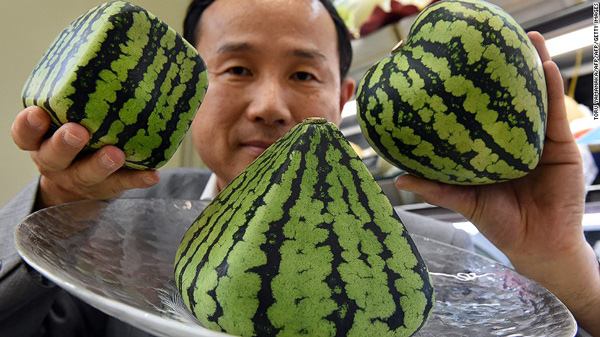
Expensive, carefully-cultivated fruit, however, is not unique to Sembikiya's stores.
不过,这样价格昂贵、精心培育的水果并非是千疋屋水果行独有的。
Across Japan, such products regularly sell for tens of thousands of dollars at auction. In 2016, a pair of premium Hokkaido cantaloupe sold for a record $27,240 (3 million yen).
在日本各地,此类农产品经常在拍卖会上以数万美元的价格卖出。2016年,一对优质的北海道哈密瓜售价创下了27240美元(约合人民币18.7万元)的纪录。
这些水果不仅在日本本土受到追捧,近年来已经远销世界各地。比如,香港连锁超市超生活在今年情人节就推出了单价约150元人民币一颗的“天价草莓”。再比如,在莫斯科一家连锁商店内,由日本培育的方形西瓜的价格高达860美元(约合人民币5300元),是普通西瓜价格的300倍。
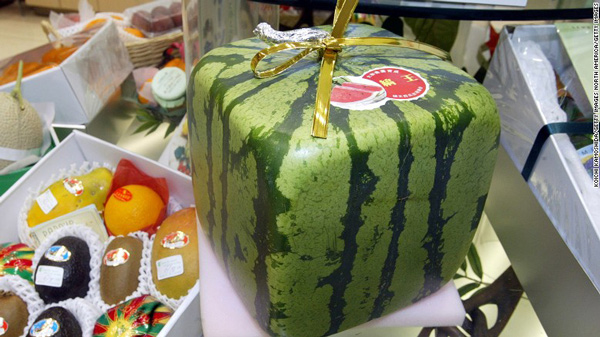
"Fruits are treated differently in Asian culture and in Japanese society especially," Soyeon Shim, dean of the School of Human Ecology at the University of Wisconsin-Madison, tells CNN. "Fruit purchase and consumption are tied to social and cultural practices.
威斯康辛麦迪逊大学人类生态学院院长沈素妍告诉CNN,“在亚洲文化中,特别是日本社会,水果是受到特殊对待的。购买和消费水果与社会文化风俗相关。”
"It is not only an important part of their diet, but, perhaps more importantly, fruit is considered a luxury item and plays an important and elaborate ritual part in Japan's extensive gift-giving practices."
“这不仅仅是日本人饮食的重要组成部分,或许更重要的是,水果被视为奢侈品,在日本普遍存在的送礼习俗中是一种重要且考究的礼节。”
Cultivating high-end produce usually involves meticulous, labor-intensive practices developed by Japanese farmers.
日本果农通常要花费大量时间、精心照料才能培育出这些高端农产品。
"It's hard getting the shape of these strawberries right - they can sometimes turn out like globes," says Okuda Nichio, of his highly-prized Bijin-hime (beautiful princess) strawberries, which he tries to grow "scoop-shaped".
Okuda Nichio种植的美姬草莓备受赞誉,他试图把这种草莓培育成“勺形”。他说:“要想获得这种形状的草莓非常难——有时候它们会变成球形。”
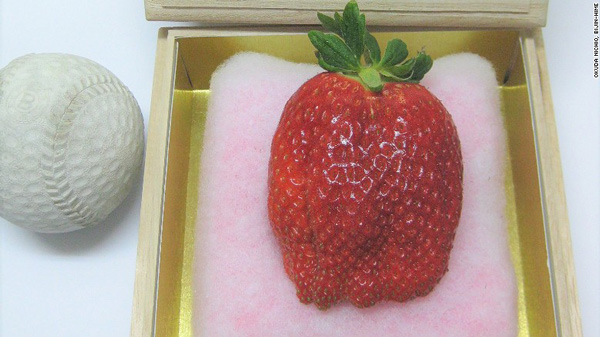
"It's taken me 15 years to reach this level of perfection."
“我花了15年才做到这种完美的水平。”
His largest tennis-ball sized strawberries, of which he only produces around 500 a year, usually sell for more than 500,000 yen($4,395) each.
他培育的美姬草莓最大有网球大小,每年只产500颗左右,单价超过4395美元(约合人民币3万元)。
Rarity is a tactic also employed by the producers of Japan's "Ruby Roman" grapes, who offer just 2,400 bunches of the large red fruit each year.
物以稀为贵也是日本“罗马红宝石”葡萄的种植者采取的策略,这种葡萄每年只产出2400串。
"These grapes look big and red - like a ruby. It's been a painstaking process to achieve that red color," Ruby Roman spokesman Hirano Keisuke says.
“罗马红宝石”发言人平野奎介说:“这种葡萄看起来又大又红——像红宝石一样。实现这种红色的过程很难。”
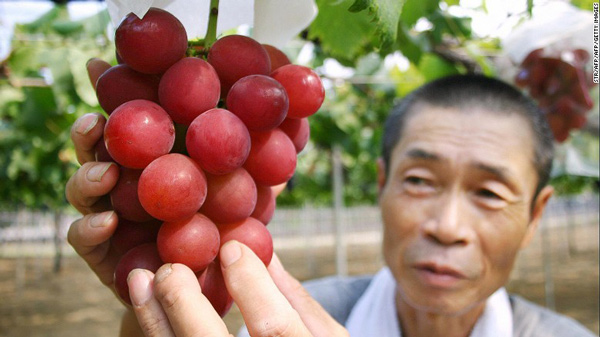
In southwest Japan last year, a supermarket paid 1.1 million yen ($9,700) for a first-harvest bunch of "Ruby Roman" at auction.
去年,日本西南部的一家超市以9700美元(约合人民币6.7万元)在拍卖会上购买了首串成熟的“罗马红宝石”。
Holding just 30 grapes in total, that record-breaking bunch essentially sold for $320 per grape.
这串售价创纪录的葡萄总共只有30粒,每粒约为320美元(约合人民币2200元)。
So why are Japanese consumers willing to pay so much for their fruit?
那么,为什么日本消费者愿意花这么多钱买水果呢?
Whereas in many Western cultures apples and oranges are prized for their nutritional value, the Japanese see fruit in almost spiritual terms, regularly offering it to the gods on their butsudan - or home altars - and Buddhist steps.
在西方文化中,人们认为苹果桔子非常有营养价值,而日本人几乎是从精神层面来看待水果的,他们定期在家里的供桌和佛坛上为神仙上供水果。
For this reason, high-end fruit has come to be viewed as an important symbol of respect.
因此,高端水果已被视为表示尊重的重要象征。
"People purchase these expensive fruits to demonstrate how special their gifts are to the recipients, for special occasions or for someone socially important, like your boss," says Shim, who has conducted extensive researched into Japan's luxury fruit market.
沈素妍对日本奢侈水果市场进行了广泛的研究,她说:“人们为特殊的场合或社交上重要的人物,比如你的老板,购买这些昂贵的水果,以证明他们送人的礼物有多么特别。”
For some consumers, a high price tag adds prestige and signifies quality.
对于一些消费者来说,昂贵的价格代表声誉和品质。
Although not all Japanese consumers buy expensive fruit to gift -- many appreciate its rarefied taste.
虽然,不是所有日本消费者都会购买昂贵的水果作为礼物,但是很多人喜欢它们罕见的口感。
But while many Japanese extol the exceptional flavors of these fruit, Cecilia Smith Fujishima, a lecturer in comparative culture at Shirayuri University in Tokyo, says it's often too sweet for her Australian-raised taste buds.
不过,尽管许多日本人对奢侈水果的独特风味赞不绝口,但东京白百合女子大学比较文化专业的讲师Cecilia Smith Fujishima表示,这种水果对她的澳大利亚味蕾来说通常都太甜了。
来源:中国日报网【责任编辑:于璧嘉】

